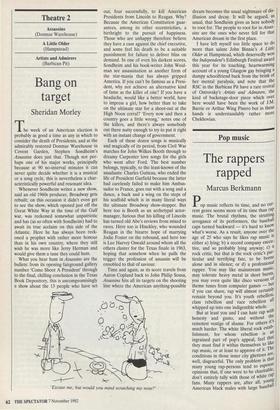Theatre 2
Assassins (Donmar Warehouse)
A Little Older (Hampstead)
Artists and Admirers (Barbican Pit)
Bang on target
Sheridan Morley
The week of an American election is probably as good a time as any in which to consider the death of Presidents, and at the admirably restored Donmar Warehouse in Covent Garden, Stephen Sondheim's Assassins does just that. Though not per- haps one of his major works, principally because at 90 no-interval minutes it can never quite decide whether it is a musical or a song cycle, this is nevertheless a char- acteristically powerful and resonant idea.
Whenever Sondheim writes a new show, said an old 1960s producer, Broadway gets rebuilt; on this occasion it didn't even get to see the show, which opened just off the Great White Way at the time of the Gulf war, was reckoned somewhat unpatriotic and has (as so often with Sondheim) had to await its true acclaim on this side of the Atlantic. Here he has always been reck- oned a prophet with rather more honour than in his own country, where they still wish he was more like Jerry Herman and would give them a tune they could hum.
What you hear hum in Assassins are the bullets: from its opening fairground gallery number 'Come Shoot A President' through to the final, chilling conclusion in the Texas Book Depository, this is uncompromisingly a show about the 13 people who have set
out, four successfully, to kill American Presidents from Lincoln to Reagan. Why? Because the American Constitution guar- antees, among its other eccentricities, a birthright to the pursuit of happiness. Those who are unhappy therefore believe they have a case against the chief executive, and some feel his death to be a suitable punishment for failure to deliver bliss on demand. In one of even his darkest scores, Sondheim and his book-writer John Weid- man see assassination as another form of the star-mania that has always gripped America. If you can't be famous as a Presi- dent, why not achieve an alternative kind of fame as the killer of one? If you have a headache, would like a better world, have to impress a girl, how better than to take on the ultimate star for a shoot-out at the High Noon corral? 'Every now and then a country goes a little wrong,' notes one of the killers, and there's always somebody out there nutty enough to try to put it right with an instant change of government.
Each of these dozen songs is musically and magically of its period, from Civil War marches for John Wilkes Booth through to dreamy Carpenter love songs for the girls who went after Ford. The best number belongs, typically, to the least-known of the assailants: Charles Guiteau, who ended the life of President Garfield because the latter had carelessly failed to make him Ambas- sador to France, goes out with a song and a dance, a buck and a wing on the steps of his scaffold which is in many literal ways the ultimate Broadway show-stopper. But here too is Booth as an archetypal actor- manager, furious that his killing of Lincoln has turned old Abe's reviews from mixed to raves. Here too is Hinckley, who wounded Reagan in the bizarre hope of marrying Jodie Foster on the rebound, and here too is Lee Harvey Oswald around whom all the others cluster for the Texas finale in 1963, hoping that somehow when he pulls the trigger the profession of assassin will be ennobled to that of saviour.
Time and again, as its score travels from Aaron Copland back to John Philip Sousa, Assassins hits all its targets on the shooting line where the American anything-possible
'Excuse me, but would you mind scratching my nose?'
dream becomes the usual nightmare of dis- illusion and decay. It will be argued, as usual, that Sondheim gives us here nobody to root for. The people to root for in Assas- sins are the ones who never fell for that American dream in the first place. I have left myself too little space to do more than salute John Binnie's A Little Older at Hampstead, which deservedly won the Independent's Edinburgh Festival award this year for its touching, heartwarming account of a young Glasgow gay bringing a dumpy schoolfriend back from the brink of her mental paralysis, and note that the RSC in the Barbican Pit have a rare revival of Ostrovslcy's Artists and Admirers, the kind of backstage-door piece which over here would have been the work of J.M. Barrie or Arthur Wing Pinero but in these hands is understandably rather more Chekhovian.










































































 Previous page
Previous page